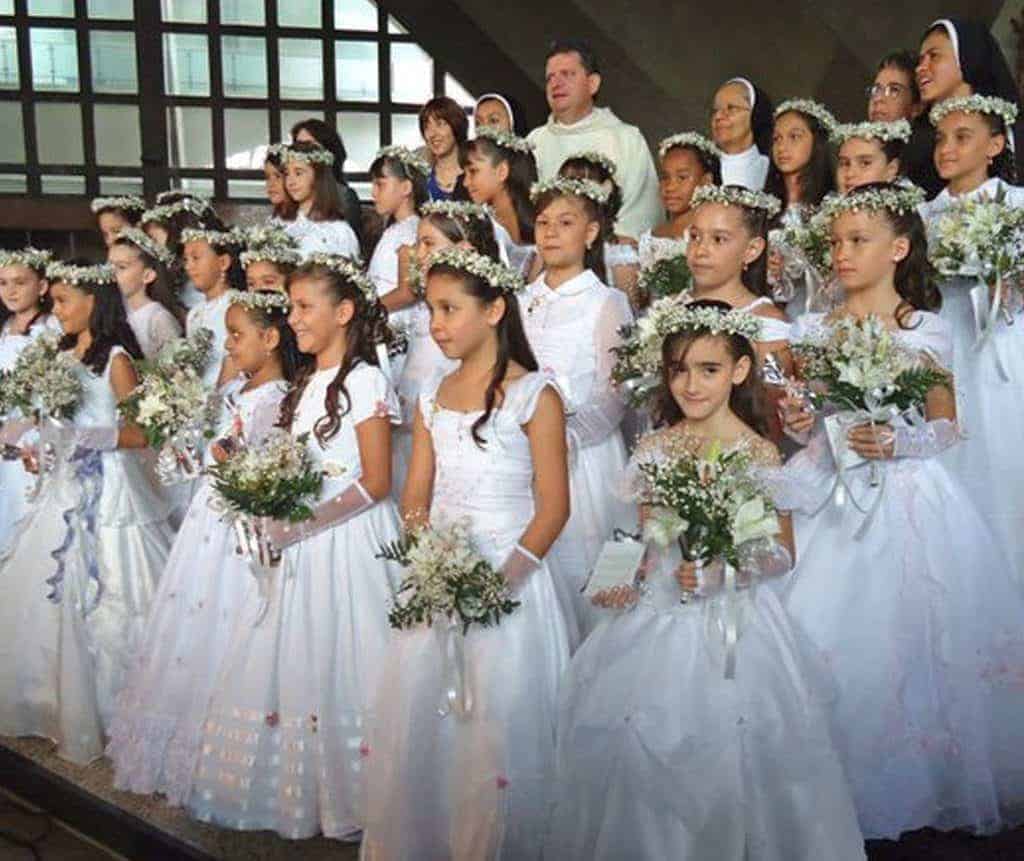First Communions represent a pivotal moment in the Catholic faith. This article examines how to prioritize its spiritual dimension over social and economic excesses. By focusing on personalized catechesis and simple celebrations, the goal is to emphasize Christian values of fraternity, love, and solidarity.
First Communions: Tradition, Faith and Christian Values
For decades, First Communions have been a key moment in the practice of the Catholic faith. However, in recent years, there has been a growing trend to transform them into social events that often overshadow their spiritual significance.
This situation calls for deep reflection that combines religious tradition, appropriate pastoral guidance, and the importance of community support for the children receiving the sacrament. Thus, there is an opportunity to promote sincere, coherent celebrations aligned with the central message of the Gospel.
The Challenge of Ostentatious Celebrations
Families often feel pressured to organize extravagant receptions. Lavish banquets, expensive clothing, and luxurious gifts have become the norm for many. Yet, we must ask ourselves whether these displays of extravagance reflect Christian commitment or divert attention from the child’s inner experience.
The First Communion is a special encounter with Jesus Christ, not a fashion show. Under this perspective, the focus should be on teaching the child the importance of the shared bread and wine, symbols of Jesus’ living presence in the Eucharist, and reinforcing a life commitment to values of simplicity, solidarity, and brotherly love.
The Role of Catechesis
Catechetical preparation must be thorough and personalized. Too often, preparation for this sacrament is reduced to a series of classes with little connection to the children’s daily lives. Therefore, the goal is to redefine catechesis so that it becomes more than a bureaucratic requirement—a journey of personal discovery.
Indeed, each parish or religious school has the opportunity to include activities that spark children’s curiosity and critical thinking. It is also recommended to work on Christian values such as compassion and social justice, so that the future communicants understand that participating in the Lord’s table implies a lifelong commitment.
In this way, the celebration of the First Communion becomes the beginning of a faith journey rather than a point of arrival for showing off elegant outfits.
Alternatives Beyond Splendor and True Commitment to Faith
Similarly, some schools and parishes propose that all children wear the same simple attire. This gesture eliminates comparisons between those wearing more expensive dresses or suits and those who do not have such resources. Additionally, it emphasizes the idea that, before the altar, we are all equal.
Consequently, there is an opportunity to reduce spending on private receptions by opting for community gatherings in parish halls or shared spaces. This alternative enhances the sense of fraternity and prevents families from incurring excessive debt driven by social pressure. It also facilitates community interaction and reinforces the communal dimension of faith.
Some parents approach the Church merely to fulfill a cultural custom, without genuine aspirations to foster religious practice in their children. It is essential to open a space for honest dialogue. In this space, the true meaning of the First Communion can be clarified, and families can be offered the possibility to postpone or rethink the ceremony if they are unsure of their commitment.
At the same time, it is important to remember that freedom of conscience and sincerity are fundamental pillars for those wishing to receive a sacrament. Therefore, the Church does not strengthen itself with inflated numbers of occasional faithful but with individuals committed to their faith and willing to nurture it over time.
Simplicity as a Path to Renewal and a Church That Listens and Guides
Christian testimony is strengthened when liturgical celebrations move away from excess and embrace simplicity. Far from impoverishing the experience, simplicity enriches it with meaning and depth. Consequently, the Church has the opportunity to guide families toward greater respect for religious symbolism and the memory of Jesus of Nazareth, who shared meals with all, especially the most vulnerable.
Similarly, families can be encouraged to perform acts of solidarity on the day of Communion: donations to charitable projects, visits to vulnerable individuals, or community actions that highlight the authentic sense of Christian fraternity. These initiatives not only reinforce the coherence of the Gospel message but also leave a formative mark on the children.
Finally, today’s Church is challenged to reconcile popular fervor with the sacred nature of the sacrament. The path lies in fostering an open and honest dialogue with the faithful. In doing so, a shared path can be charted, prioritizing the experience of faith and the dignity of the liturgical act, without resorting to severe impositions or excessive permissiveness.
Maestro Ruada — Christianity and the Catholic Church





